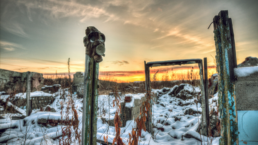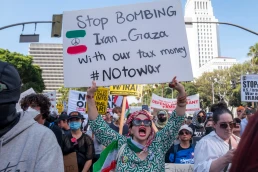A nuclear winter would be a global climate catastrophe. But climate change itself also makes nuclear war more likely.
By Ryan Black
Climate change and nuclear weapons are inherently connected. Even a “limited” nuclear war would be catastrophic for the Earth’s climate.

For example, computer models have shown what a “limited” nuclear war between India and Pakistan could lead to – a war in which less than 3 percent of the world’s nuclear weapons would potentially be detonated. In those models, the average global temperature would decrease by up to 7 degrees centigrade, precipitation would decrease by up to 40 percent, and sunlight would decrease by up to 30 percent.
Beyond the millions or tens of millions directly killed by the bombs, the smoke generated by subsequent firestorms would lead to a massive decline in agricultural production, which would lead to the starvation of up to an estimated 2 billion people.
To make things worse, the smoke and soot would lead to global cooling and ozone depletion that would allow more ultraviolet radiation to reach Earth’s surface.
Nuclear Winter
These effects in total are part of what scientists call “nuclear winter” – global cooling resulting from smoke and ash blocking the sun. Climate models have projected this since 1983. Essentially, a nuclear war anywhere will lead to a nuclear winter everywhere.
Here’s the scariest quote from the 1983 study:
When combined with the prompt destruction from nuclear blast, fires, and fallout and the later enhancement of solar ultraviolet radiation due to ozone depletion, long-term exposure to cold, dark, and radioactivity could pose a serious threat to human survivors and to other species. … The possibility of the extinction of Homo sapiens cannot be excluded.
And this is just a so-called “limited” nuclear war. A full-scale nuclear war would be even worse for humans and the planet. A 2019 study showed that Iowa, for example, would experience temperatures below freezing continuously for 730 days in the event of a nuclear war between the U.S. and Russia. Billions of people would die from famine in the aftermath. Food production would decrease 90%. Global fish stocks would be decimated. The effects of a large-scale nuclear war on the environment and the climate mean that almost everyone on the planet would starve to death, if they weren’t killed in the initial blasts.
But it’s not just that a nuclear war would lead to a worldwide environmental and climate disaster – it works the other way, too. Climate change is already making the possibility of nuclear war, and nuclear winter, more likely.
Climate Change Leads To Increased Tension Between Nuclear-Armed Countries
Researchers have said that extreme droughts in Syria led to a mass migration of people to urban areas, which led to social issues which brought about the uprising there that eventually led to the U.S. and Russia both intervening there. That conflict, spurred on by climate issues, increased tensions between the world’s two nuclear superpowers.
In a 2019 paper, researchers found that intensifying climate change is likely to increase the risk of future organized armed conflicts, estimating that, “3–20% of conflict risk over the past century has been influenced by climate variability or change.”
This is why climate activists, who are doing amazing work and bring a ton of energy, skill, and passion to their activism, should consider becoming nuclear disarmament activists too. Because nuclear winter is climate change in fast-forward. It’s everything climate activists want to avoid, but it could happen in an instant.
Ryan Black is a political activist and multimedia content creator. He is an organizer at RootsAction.org and ProgressiveHub.net. Find him on Twitter at @RBpolitic
Recent Posts
Is A Citizens United 2.0 Right Around The Corner?
July 15, 2025
Take Action Now Is it possible for American democracy to be further degraded by the influence of billionaires? Thanks to champion of the working…
U.S. Leaders Gave Up On Diplomacy With Iran. We Must Make Them Return To It.
July 15, 2025
Take Action Now Building an antiwar movement means preventing the systemic U.S. aggression that creates the conditions for war.By Hanieh Jodat,…
What To Do When You See ICE In Your Neighborhood
July 14, 2025
Take Action Now How can you deter the Trump administration’s immigrant deportation machine when it pops up in your community? Follow these…
ICE Campaign Of Violence Will Lead To More Deaths
July 14, 2025
Take Action Now Jaime Alanis’s death shows the horrific consequences of a secret police force behaving with utter impunity.By Natasha Lennard, The…




